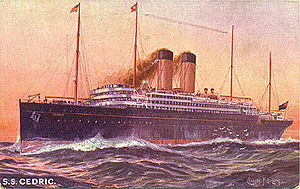RMS Cedric

| |
| History | |
|---|---|
| Operator | White Star Line |
| Port of registry | |
| Route | Liverpool to New York |
| Builder | Messrs Harland & Wolff,Ltd,Belfast |
| Launched | 21 August 1902 |
| Maiden voyage | 11 February 1903 |
| Fate | Sold to Thos. W. Ward and scrapped at Inverkeithing in 1932 |
| Notes | Homeport - Liverpool |
| General characteristics | |
| Tonnage | 21,073 gross tons |
| Length | 700 feet overall |
| Beam | 73 feet |
| Depth | 44 feet |
| Installed power | 2 quadruple expansion 4 cylinder reciprocating steam engines @ 14000 shaft horse power. |
| Propulsion | Twin propeller |
| Speed | 17 knots |
| Capacity | 1,223 passengers |
| Crew | 486 officers and crew |
| Notes | list error: <br /> list (help) 5 Decks Ship Colours: Black hull with gold line, red boot-topping, upper works white, funnels buff with black tops |
RMS Cedric was laid down in 1902 at the shipyard of Harland & Wolff, Belfast. RMS Cedric was the second of White Star's series known as the "Big Four", the other three being RMS Celtic, Baltic and RMS Adriatic. The RMS Celtic was the first ship to exceed Brunel's SS Great Eastern in overall tonnage, which was quite an accomplishment, considering Brunel's giant ship held the size record for almost 40 years. Except for the Adriatic all of these in turn, when built, would be the largest ship in the world for a short time. The RMS Cedric was a 21,035 gross ton ship, length 700 ft (213.36 m) x beam 75.3 ft (22.95 m), two funnels, four masts, twin screw and a service speed of 16 knots. There was accommodation for 365 First, 160 Second and 2352 Third Class passengers. She was launched on 21 August 1902, and RMS Cedric commenced her maiden voyage from Liverpool to New York on 11 February 1903. This was the only route on which she was ever used, although Cedric was also sometimes used for winter cruises to the Mediterranean.
Trans-Atlantic service
For the next 11 years she plied the Atlantic crossing with out any major incident. When the Titanic sank in April 1912 Cedric was in New York and her departure was delayed until the RMS Carpathia arrived with survivors, including crew members not required for the Court of Enquiry, who wished to travel back to Liverpool. The Cedric however had to sail without any of the Titanic's survivors or crew due to their mandated appearances for testimony at the U.S. Inquiry. Her last voyage on the Liverpool-New York service started 21 October 1914 after which she was she was requisitioned for war service, and she was then converted to an Armed Merchant Cruiser. The Cedric was decommissioned in 1916, and then she was converted into a troopship for operation initially to Egypt and then to the USA. In April 1917 her operation came under the auspices of the Liner Requisition Scheme. On 29 January 1918 the Cedric collided with, and sank the Canadian Pacific ship Montreal off Morecambe Bay. The Montreal was taken in tow but sank the next day 14 miles (23 km) from the Mersey Bar lightship. She was returned to her owner in September 1919 and refitted by Harland & Wolff. She was refitted to accommodate 347 First, 250 Second and 1000 Third Class passengers. She resumed Liverpool – New York voyages. On 30 September 1923 the Cedric collided with RMS Scythia of the Cunard Line in Queenstown (Cobh) harbour during dense fog. Neither vessel was seriously damaged. On 23 October 1926 she was again altered to Cabin, Tourist and Third Class. Her last Liverpool – New York sailing commenced 5 September 1931 and she was sold later the same year, for £22,150 to Thos. W. Ward and scrapped at Inverkeithing in 1932.
Gallery
-
A transcribed copy of the ships log dated 21 October 1903
References
http://www.greatoceanliners.net/cedric.html
